

Digital literacy and the national curriculum for England - Polizzi (2020) 1.
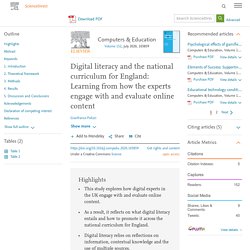
Introduction Defined as the ability to access, analyse, evaluate and produce messages in a variety of forms, media literacy is advocated by academics and educationalists for contributing to well-informed citizens who engage with information critically and autonomously, participating in society and democracy (Aufderheide, 1993; Hobbs, 2010). In the UK, while information is highly mediated by digital technologies, only 2% of primary and secondary school children are able to identify false information online when taking a misinformation quiz.
Three in five say misinformation makes them trust the news less, and half are worried about whether they can identify misinformation (National Literacy Trust, 2018). While half of 12- to 15-year-olds find it hard to tell whether content on social media is true, two in five have come across misinformation. 2. 2.1. But how should input from IT and media professionals be incorporated into media education? Such a lacuna also applies to research. 2.2. The Digital Life Skills Company. Teaching Citizenship - Association for Citizenship Teaching (2020) Institute for Strategic Dialogue - education programme. Ask for Evidence - Sense about Science. Fact or fake - BBC Bitesize. Connecting Classrooms - British Council. School Libraries Work! Fighting fake news by teaching neuroscience & social psychology (2020)
Guest blog: Dr Graham Gardner, Librarian, Abingdon School Introduction From claims over the size of the crowd at Donald Trump’s inauguration to automated “bots” retweeting disinformation generated in the “fake news” factories of Macedonia, the spread of disinformation, misinformation and outright falsehoods had become integral to contemporary life.
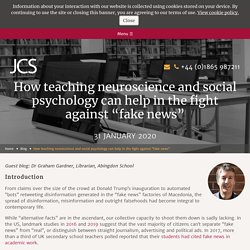
While “alternative facts” are in the ascendant, our collective capacity to shoot them down is sadly lacking. In the US, landmark studies in 2016 and 2019 suggest that the vast majority of citizens can’t separate “fake news” from “real”, or distinguish between straight journalism, advertising and political ads. In 2017, more than a third of UK secondary school teachers polled reported that their students had cited fake news in academic work. Resistance to information literacy education The rationale for an intense focus on “information literacy” couldn’t be clearer. Source: Many students unfortunately, might beg to differ. It was a dilemma. IL in the age of algorithms (2020) NewsWise evaluation report 2018-19. This report evaluates the impact of the first year of NewsWise – a free, cross-curricular news literacy programme for 9- to 11-year-olds across the UK, developed by the Guardian Foundation, the National Literacy Trust and the PSHE Association, and funded by Google.
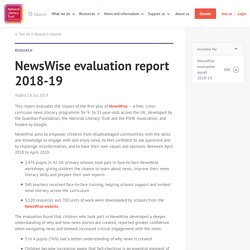
The Challenge That's Bigger Than Fake News (2017) Since the November 2016 presidential election, coverage of “fake news” has been everywhere. It’s hard to turn on the TV without hearing the term. Google and Facebook have pitched plans for fighting the menace.1 State legislators have even introduced bills to mandate K–12 instruction on the topic.2 Fake news is certainly a problem. Sadly, however, it’s not our biggest. Fact-checking organizations like Snopes and PolitiFact can help us detect canards invented by enterprising Macedonian teenagers,3 but the Internet is filled with content that defies labels like “fake” or “real.” For every social issue, there are websites that blast half-true headlines, manipulate data, and advance partisan agendas. The Internet dominates young people’s lives. Unfortunately, our research at the Stanford History Education Group demonstrates they don’t.* Between January 2015 and June 2016, we administered 56 tasks to students across 12 states.
Charlotte Project. Information Literacy Spaces. NewsWise. IB IBSCA Report 2017 V02. Great School Libraries campaign - CILIP & SLA. Fake news and critical literacy resources. This series of fake news and critical literacy resources have been created in response to the findings and recommendations from the Commission on Fake News and the Teaching of Critical Literacy Skills in Schools.
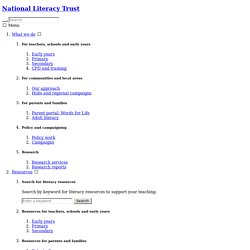
These resources are designed to help primary and secondary teachers, parents and school librarians equip children with the critical literacy skills they need to survive and thrive in today's digital world. The resources include: Primary Primary teaching resource which includes practical lesson ideas, critical questions and a directory of useful organisations and further resourcesPrimary discussion cards to help students think more critically about the texts they read in lessonsPrimary poster for displaying in the classroom Secondary Parents.
Commission on Fake News and the Teaching of Critical Literacy Skills in Schools. Children and young people today are growing up in a globalised world and are processing information from a wider variety of sources than ever before.
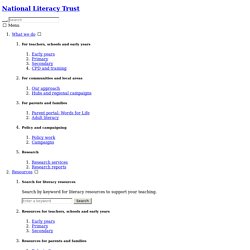
They need the critical literacy skills to navigate the potential pitfalls when consuming news, particularly when using online sources and social media. But the final report from the Commission on Fake News and the Teaching of Critical Literacy Skills in Schools, published on 13 June 2018, found that only 2% of children and young people in the UK have the critical literacy skills they need to tell if a news story is real or fake. It also found that almost two-thirds of teachers believe fake news is harming children’s well-being by increasing levels of anxiety, damaging their self-esteem and skewing their world view. The Economist Educational Foundation. TeenTech research & IL resources. Digital literacy across the curriculum - Futurelab (2010) Teacher's Guide to Digital Citizenship (2015) The horror stories of young people not grasping the reach and influence of the content they put online are familiar to all of us.
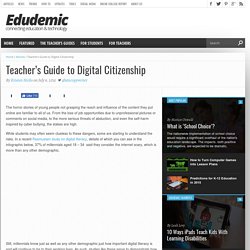
From the loss of job opportunities due to unprofessional pictures or comments on social media, to the more serious threats of abduction, and even the self-harm inspired by cyber bullying, the stakes are high. While students may often seem clueless to these dangers, some are starting to understand the risks. In a recent Rasmussen study on digital literacy, details of which you can see in the infographic below, 37% of millennials aged 18 – 34 said they consider the internet scary, which is more than any other demographic. Still, millennials know just as well as any other demographic just how important digital literacy is and will continue to be to their working lives.
As such, studies like these serve to demonstrate how crucial teaching digital literacy — particularly at a young age when that digital footprint is still lightly drawn — has become. Bibliostory - educational IL comic strips from Poland. Jak rozwijać umiejętności informacyjne i medialne dzieci i młodzieży?
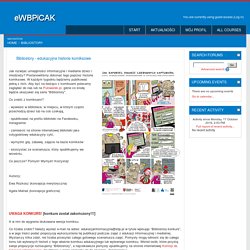
Postanowiliśmy dokonać tego poprzez historie komiksowe. W każdym tygodniu będziemy publikować jedną z nich. Aby być na bieżąco z komiksami polecamy zaglądać do nas lub na Pulowerek.pl, gdzie co środę będzie ukazywać się seria "Bibliostory". Co zrobić z komiksami? - wywiesić w bibliotece, w miejscu, w którym często przechodzą dzieci lub na coś czekają, How youth navigate the news landscape.